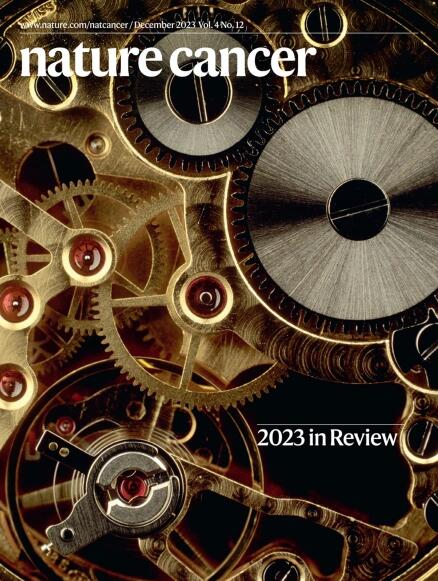CHD1缺失重编程srebp2驱动的胆固醇合成,在spop突变的前列腺肿瘤中促进雄激素响应性生长和去势抵抗。
IF 28.5
1区 医学
Q1 ONCOLOGY
引用次数: 0
摘要
尽管接受了去势治疗,大多数前列腺癌(PCa)患者仍会发展为去势抵抗性前列腺癌(CRPC),其中雄激素受体(AR)仍然是一个重要的驱动因素。SPOP和CHD1同时发生的基因改变定义了一种独特的PCa亚型,但它们在肿瘤进展和治疗反应中的相互作用尚不清楚。在这里,我们提供了遗传证据,支持CHD1缺失加速了spop突变的男性前列腺癌的疾病进展,并赋予其对阉割的抵抗力。通过利用基因工程和多组学,我们发现CHD1通过抑制SREBP2转录组在脂质代谢重编程中的非规范功能。CHD1的缺失诱导胆固醇生成,提供肿瘤内雄激素的生物合成,增强AR活性,导致spop突变PCa的去势抵抗。抗雄激素治疗联合降胆固醇药物对携带CHD1缺失和SPOP突变的CRPC具有协同和持久的活性。这些发现促进了我们对新出现的前列腺癌亚型的理解,并为CRPC患者提供了生物标志物驱动的联合治疗策略。本文章由计算机程序翻译,如有差异,请以英文原文为准。

CHD1 loss reprograms SREBP2-driven cholesterol synthesis to fuel androgen-responsive growth and castration resistance in SPOP-mutated prostate tumors
Despite undergoing castration, most individuals with prostate cancer (PCa) experience progression to castration-resistant PCa (CRPC), in which the androgen receptor (AR) remains an important driver. Concurrent genetic alterations in SPOP and CHD1 define a unique subtype of PCa, but their interactions in tumor progression and therapy response remain unclear. Here, we provide genetic evidence supporting that CHD1 loss accelerates disease progression and confers resistance to castration in males with SPOP-mutated PCa. By leveraging genetic engineering and multiomics, we uncovered a noncanonical function of CHD1 in lipid metabolism reprogramming via repressing the SREBP2 transcriptome. Loss of CHD1 induces cholesterol production, supplies intratumoral androgen biosynthesis and enhances AR activity, leading to castration resistance of SPOP-mutated PCa. Combining anti-androgen therapy with cholesterol-lowering drugs showed synergistic and durable activity against CRPC harboring CHD1 loss and SPOP mutations. These findings advance our understanding of an emerging PCa subtype and offer biomarker-driven combinatorial treatment strategies for men with CRPC. Chen at al. show that CHD1 loss in SPOP-mutated prostate tumors confers castration resistance by increasing SREBP2-mediated cholesterol synthesis and subsequent androgen supply, an effect counteracted by combined androgen and cholesterol inhibition.
求助全文
通过发布文献求助,成功后即可免费获取论文全文。
去求助
来源期刊

Nature cancer
Medicine-Oncology
CiteScore
31.10
自引率
1.80%
发文量
129
期刊介绍:
Cancer is a devastating disease responsible for millions of deaths worldwide. However, many of these deaths could be prevented with improved prevention and treatment strategies. To achieve this, it is crucial to focus on accurate diagnosis, effective treatment methods, and understanding the socioeconomic factors that influence cancer rates.
Nature Cancer aims to serve as a unique platform for sharing the latest advancements in cancer research across various scientific fields, encompassing life sciences, physical sciences, applied sciences, and social sciences. The journal is particularly interested in fundamental research that enhances our understanding of tumor development and progression, as well as research that translates this knowledge into clinical applications through innovative diagnostic and therapeutic approaches. Additionally, Nature Cancer welcomes clinical studies that inform cancer diagnosis, treatment, and prevention, along with contributions exploring the societal impact of cancer on a global scale.
In addition to publishing original research, Nature Cancer will feature Comments, Reviews, News & Views, Features, and Correspondence that hold significant value for the diverse field of cancer research.
 求助内容:
求助内容: 应助结果提醒方式:
应助结果提醒方式:


